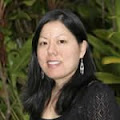Day 1: It seems the economy or the time is affecting the conference, it seemed smaller than NHEA's I've been to in the past. Still, it was nice to be with this community of people and share in this experience. The morning panel, Nānā i Ke Kumu, comprised of Naomi Losch, Richard and Lynette Paglinawan, Noelani Mahoe, and James Ka‘upena Wong. Each one shared a different mo‘olelo about their relationship to Tūtū Puku‘i or Puna as James called her. They expressed their gratitude for having known her and all mentioned her kindness and generosity. One takeaway for me, Naomi mentioned that Tūtū Puku‘i would write things down regularly. That came across in our video with Keola Chan last week too. We need to be documenting what we are learning from our kūpuna or what we are observing in our environment. If we don't, sometimes things get lots. So that's one message we'd like to share in the upcoming revision...document and share with each other.
KS Table: I had a shift at our KS table with Bobbie who is new to the regional resource centers. I always enjoy meeting other staff and sharing what we do within the organization. The traffic was minimal but I know the need for us (KS) to have a presence.
Day 2: My day started with a morning workshop on Na Honua Maoli Ola. Brandon Ledward was also there to share the research that KS has done and the newsbriefs on CBE. The workshop attendees seemed very interested in the statistics and wanted more information to share with others at their school/organization. For the workshop, we were taken through a lesson plan about tradition. Looking at what is a tradition, taking a stance on banning fireworks and a strategy for paragraph writing. The takeaway for me was the draft of the new guidelines. The format includes lesson plans and discussion questions so I think it will be very applicable to teachers.
After lunch, I sat in the session before mine that was about Hawaiian Health Law. Pualeilani shared her research that she received a grant for. It was very high-level presentation about Public Law and how she was looking for evidence of public law in historical Hawaiian Society (about 1830-1890). I admired her passion for searching for the connection and wading through tons of documentation.
My presentation was the last presentation of the day, not a great spot. I had 5 attendees sit in, one more stopped by to grab material. Even though we structured the presentation from a collaboration standpoint, 4 of them came more for personal interest, how they could gain knowledge. Michael Cawdery from LCC came as a guest to share how they are working with us and that was an added bonus. I guess with low attendance and the competing schedule (huaka‘i scheduled at the same time as six workshops) it would be hard to dedicate resources to present next year.
KS Table: I had a shift at our KS table with Bobbie who is new to the regional resource centers. I always enjoy meeting other staff and sharing what we do within the organization. The traffic was minimal but I know the need for us (KS) to have a presence.
Day 2: My day started with a morning workshop on Na Honua Maoli Ola. Brandon Ledward was also there to share the research that KS has done and the newsbriefs on CBE. The workshop attendees seemed very interested in the statistics and wanted more information to share with others at their school/organization. For the workshop, we were taken through a lesson plan about tradition. Looking at what is a tradition, taking a stance on banning fireworks and a strategy for paragraph writing. The takeaway for me was the draft of the new guidelines. The format includes lesson plans and discussion questions so I think it will be very applicable to teachers.
After lunch, I sat in the session before mine that was about Hawaiian Health Law. Pualeilani shared her research that she received a grant for. It was very high-level presentation about Public Law and how she was looking for evidence of public law in historical Hawaiian Society (about 1830-1890). I admired her passion for searching for the connection and wading through tons of documentation.
My presentation was the last presentation of the day, not a great spot. I had 5 attendees sit in, one more stopped by to grab material. Even though we structured the presentation from a collaboration standpoint, 4 of them came more for personal interest, how they could gain knowledge. Michael Cawdery from LCC came as a guest to share how they are working with us and that was an added bonus. I guess with low attendance and the competing schedule (huaka‘i scheduled at the same time as six workshops) it would be hard to dedicate resources to present next year.

Comments